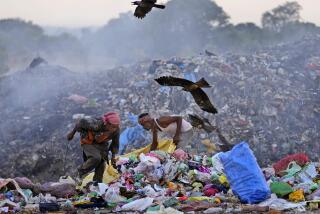Danger Points in San Diego Trash : Disease: Trash collectors face the danger of contracting diseases if they are jabbed by the hypodermic needles that are careless discarded with garbage.
- Share via
Jose Reyes and Raymond Mason know their job is a dirty one and somebody has to do it.
But the two trash haulers for San Diego never thought the job might be dangerous to their health.
Reyes, 46, changed his mind about job safety last December when he grabbed a small plastic garbage bag along his 38th Street route and felt something sharp pierce his thumb.
Reyes turned the bag over and watched in horror as a hypodermic needle fell to the sidewalk in the neighborhood plagued by drug addicts and prostitutes.
Mason’s wariness surfaced in January, after he was cut by a hypodermic needle while collecting trash along his drug-ravaged Dream Street route.
“This job has become very dangerous because people just put their garbage out and are not careful of how they package it, so it is harmful to the collectors’ health to pick up some of this stuff,” Mason said. “I am scared of getting AIDS, but I never thought my job would put me at jeopardy of getting it.”
Reyes and Mason pick up trash for San Diego’s Waste Management Department, a 4-year-old city agency responsible for collecting, disposing and recycling waste.
This week, because of the recent increase in needle jabs to workers and other injuries, the agency appealed to city residents, asking them to bundle trash more carefully to help workers avoid diseases, a department spokeswoman said.
The agency is urging people to wrap broken glass and sharp objects in newspaper and to place hypodermic needles in sealed tins--such as coffee cans.
And while Reyes’ and Mason’s injuries are among the first needle accidents reported so far, the agency wants to make sure theirs are also the last.
“Our workers are growing more and more concerned about the everyday risks associated with their job,” department spokeswoman Terri Steele said. “(We are) asking diabetics and others who consistently use needles for medical purposes to take extra care to package the needles before they dispose of them.”
Last year, the department reported at least 60 injuries to refuse collectors caused by broken glass or sharp objects--even though their 235 trash collectors are required to wear goggles, masks and heavy leather gloves for safety, Steele said.
Being jabbed by a hypodermic needle can also be psychologically painful, Steele said, because the trash haulers know that a myriad of diseases including, hepatitis and AIDS, can be spread via a needle prick.
“The emotional trauma of being stuck with a hypodermic needle, particularly when the source of the needle is unknown can be devastating,” Steele said.
Reyes and Mason know that firsthand.
After being pricked, Reyes went door-to-door in the blue-collar community searching for the dirty needle’s origin, hoping it wasn’t from a person infected with AIDS.
“We tried to talk to the people around there, but everyone denied it was their trash and kept pointing fingers toward everyone else,” Reyes said.
Mason was a little luckier in his search and found an elderly couple with diabetes on the block who admitted the needle was theirs.
Both men, who went back to work the same day they were injured, were given hepatitis and tetanus shots and were told to get AIDS tests.
But, so far, both men have yet to be tested for the disease because, they feel, ignorance is bliss.
“Nothing like this has ever happened to me before, and I hope this is the last time because I know AIDS is a slow, painful death,” Mason said.
“I am kind of leery about getting an AIDS test and to learn that this person (who used the needle) may have been an AIDS carrier,” Reyes said. “Picking up trash nowadays is a matter of life and death.”
More to Read
Sign up for Essential California
The most important California stories and recommendations in your inbox every morning.
You may occasionally receive promotional content from the Los Angeles Times.













